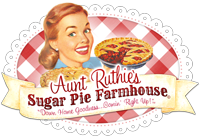
Pickling Cucumbers washed and ready
and sliced all 6 1/2 pounds of them

Sliced Cukes
along with some onions and mixed them together in a bowl with a lot of salt. I then covered them with ice cubes 2 inches deep and allowed them to rest in the fridge for 4-5 hours. After their salty cold rest I brought them out and started to make their sweet pickling syrup using the pickling "software" shown below:

Pickling spices, sugar and vinegar
Below is a shot of the pickling "hardware" (see also the "jar lifter" in the above photo, a very necessary tool)

Measuring cup, ladle, wide mouth funnel, cook pot and canner
After boiling the sweet pickle syrup for a few minutes I added the vegetables into the syrup pot and carefully brought the whole thing back to a boil. At that point it was time to fill and seal the hot jars and place them into the canner for their hot water bath. Processing them 15 minutes for sweet pickles at our elevation of 3000ft.

Canner filled with pickle jars at full boil (lots of steam on a hot August night!)
I am now the proud producer of 9 pints of beautiful homegrown and homemade bread & butter pickle chips. I don't always get a really good harvest of cucumbers, so it pleases me very much to have a heavy crop this year. I love to make them into pickles as well as eat them fresh. Some years I have enough to make Kosher Dill Spears too.

Bread & Butter Pickles ~ 9 Pints!
Now I need to hide them from Hardware Bob as he is addicted to sweet pickles...
© Copyright 2008 Mountain Harvest Basket














8 comments:
I heard that, so where does the line form for those yummy looking bread and butter pickle samples?
There's a lot of work involved with canning, your stage by stage report with photos was fabulous.
Now I know why you are always so protective of your home made pickles.
Farmer Jen! how are you? Thanks for the comment on Portland Foodie...I have been horrible about visiting blogs this summer...but I will be back full force in the fall!
Those pickles look so yummy. You are a very talented woman.
(Hey, HW Bob, I'll figure out how to score you some of those B&B pickle samples, if you'll tell me the DOB of our friend, Jen...) ;-)
(I'm very sorry to read of the passing of your friend and fellow townsperson, Curtis Kirk.)
sigh. another comment so i can check that lil response box at the bottom...it didn't show up the first time :-)
Hi Bob,
You'll get some pickles. They need to age to pickle perfection for awhile first. Yes, canning takes time and can be a lot of work. I do enjoy doing it once I have everything set up and enough uninterrupted time to do it stress free.I like knowing what goes in my food came from my own organic garden.
Hi JeanAnn,
Good to hear from you! I don't remember a Portland Foodie comment, but thanks for the thanks. I do visit your gardening blog from time to time.
Hi Danni,
Thank you for the nice compliments! The pickles turned out great. They do get better after a couple of weeks in the jars though.
Thanks also for your kind words about Curtis. His death was not unexpected, but still seemed rather sudden to us.
Sorry Danni, I can't give the DOB secret away, I want my pickles.
I enjoyed your pickling post, Farmer Jen. Thank you.
Sorry for not visiting more often. I've been really bad at visiting many of my favorite blogs this past summer. :)
I enjoy your blog very much and am glad to see all of your thoughtfully written entries.
By the way, does elevation matter when it comes to canning. You mentioned you are at 3,000 ft. We are at 7,000 ft elevation. It seems I'm always having to tweak recipes, especially bread, up here.
Hi Twinville,
Thank you for the compliments on my writing. You have been busy this summer! I read your blog every few days, but don't always comment.
Yes, elevation does matter when canning. You want the jars to be sealed and sterilized properly when home canning. Depending on what you are canning, you will have to process the filled jars in boiling water for a longer period of time at higher altitudes than a sea-level recipe calls for because water boils at a lower temperature than 212 degrees when you are at a higher altitude. The same goes for pressure canning. I found the "USDA Complete Guide to Home Canning" very useful when I was learning to can and I still refer to it. You can find that document and a lot of other useful info including the elevation process time adjustments at these links:
http://foodsafety.psu.edu/preserve.html
and
http://foodsafety.psu.edu/canningguide.html
Post a Comment